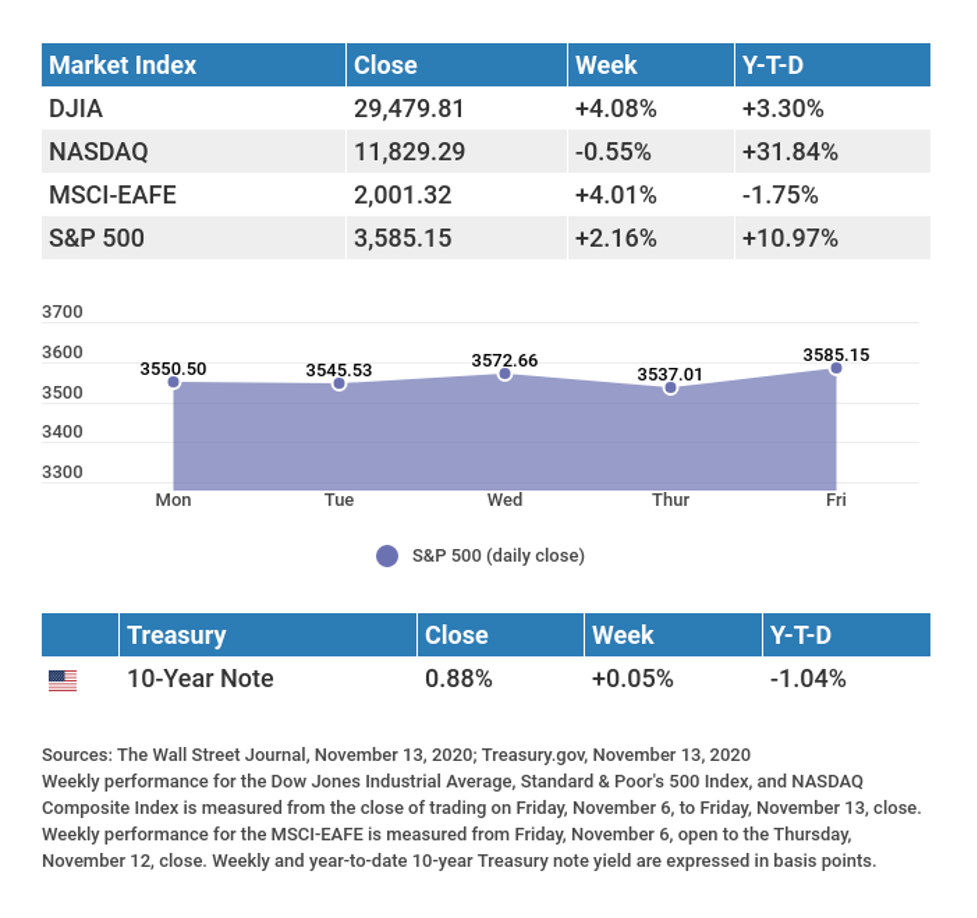In this week’s recap: A COVID-19 vaccine spurs a stock market rally, even as more cases are reported and some areas renew lockdowns.
Weekly Economic Update
Presented by Craig Moore, November 16, 2020
THE WEEK ON WALL STREET
News of a COVID-19 vaccine ignited a rally in economically sensitive stocks and a broad retreat in technology companies last week, though enthusiasm was tempered by reports of rising new infections and fresh lockdowns.
The Dow Jones Industrial Average surged 4.08%, while the Standard & Poor’s 500 rose 2.16%. The Nasdaq Composite index fell 0.55% for the week. The MSCI EAFE index, which tracks developed overseas stock markets, jumped 4.01%.1,2,3
Vaccine Hopes
Reports of an effective COVID-19 vaccine sent stocks soaring on Monday as the end to economic uncertainty appeared to be in sight. Stocks that had been pummeled by economic lockdowns surged on the news, while the stay-at-home stocks suffered steep declines. Bond yields and oil prices both moved higher on expectations of increased economic activity.
Market enthusiasm evaporated in the days that followed, however, as higher COVID-19 infections, new lockdowns, and low expectations for a new fiscal stimulus package dampened the optimism brought on by the pending vaccine.
Stocks closed the week on a higher note, with cyclical stocks adding to their gains and technology companies shaving part of their losses.
Clouds Over Chinese Capitalism?
The market was caught by surprise last week when Chinese regulatory authorities issued draft guidelines to address concerns over abusive monopolistic practices. Shares in some of the biggest Chinese technology companies dropped on the news. This follows the prior week’s suspension of a listing of a large initial public offering for one of the country’s leading fintech companies.
It’s difficult to say whether Chinese regulators are acting on concerns that western nations have with the dominance of Big Tech companies, or if they are attempting to rein in the power and influence of privately owned corporations. An answer may not be clear anytime soon, but investors will be watching.
T I P O F T H E W E E K
Adult children may ask you to help them out with business financing or a down payment on a property. While it’s tempting to say yes, it’s may be best to determine if your personal finances can handle it.
THE WEEK AHEAD: KEY ECONOMIC DATA
Tuesday: Retail Sales.
Wednesday: Housing Starts.
Thursday: Existing Home Sales, Jobless Claims, Index of Leading Economic Indicators.
Source: Econoday, November 13, 2020
The Econoday economic calendar lists upcoming U.S. economic data releases (including key economic indicators), Federal Reserve policy meetings, and speaking engagements of Federal Reserve officials. The content is developed from sources believed to be providing accurate information. The forecasts or forward-looking statements are based on assumptions and may not materialize. The forecasts also are subject to revision.
THE WEEK AHEAD: COMPANIES REPORTING EARNINGS
Monday: Palo Alto Networks (PANW), Tyson Foods, Inc. (TSN), JD.com, Inc. (JD).
Tuesday: Walmart (WMT), The Home Depot (HD).
Wednesday: Nvidia Corp. (NVDA), Target Corp. (TGT), Lowe’s Companies (LOW), The TJX Companies (TJX).
Thursday: Workday, Inc. (WDAY), Ross Stores (ROST), Intuit (INTU), Netease, Inc. (NTES).
Source: Zacks, November 13, 2020
Companies mentioned are for informational purposes only. It should not be considered a solicitation for the purchase or sale of the securities. Investing involves risks, and investment decisions should be based on your own goals, time horizon, and tolerance for risk. The return and principal value of investments will fluctuate as market conditions change. When sold, investments may be worth more or less than their original cost. Companies may reschedule when they report earnings without notice.
Q U O T E O F T H E W E E K
“What we obtain too cheap, we esteem too lightly.”
THOMAS PAINE

T H E W E E K L Y R I D D L E
A rooster sits atop a farmhouse. Its roof is unequally pitched. One half slopes down at an angle of 60º, and the other half at 70º. If the rooster lays an egg right on the peak of the roof, on which side is the egg more likely to fall?
LAST WEEK’S RIDDLE: Two-and-a-half artists spend two-and-a-half hours painting two-and-a-half models on two-and-a-half canvases. How many artists would be necessary to paint 24 models on 24 canvases in 20 hours?
ANSWER: This would only require three artists. 24 artists can paint 24 models in 2.5 hours. Since the time available has increased by eight (20 = 8 * 2.5), then you can reduce the number of artists by the same amount (3 = 24 / 8).
Investing involves risks, and investment decisions should be based on your own goals, time horizon, and tolerance for risk. The return and principal value of investments will fluctuate as market conditions change. When sold, investments may be worth more or less than their original cost.
The forecasts or forward-looking statements are based on assumptions, may not materialize, and are subject to revision without notice.
The market indexes discussed are unmanaged, and generally, considered representative of their respective markets. Index performance is not indicative of the past performance of a particular investment. Indexes do not incur management fees, costs, and expenses. Individuals cannot directly invest in unmanaged indexes. Past performance does not guarantee future results.
The Dow Jones Industrial Average is an unmanaged index that is generally considered representative of large-capitalization companies on the U.S. stock market. Nasdaq Composite is an index of the common stocks and similar securities listed on the Nasdaq stock market and is considered a broad indicator of the performance of technology and growth companies. The MSCI EAFE Index was created by Morgan Stanley Capital International (MSCI) and serves as a benchmark of the performance of major international equity markets, as represented by 21 major MSCI indexes from Europe, Australia, and Southeast Asia. The S&P 500 Composite Index is an unmanaged group of securities that are considered to be representative of the stock market in general.
U.S. Treasury Notes are guaranteed by the federal government as to the timely payment of principal and interest. However, if you sell a Treasury Note prior to maturity, it may be worth more or less than the original price paid. Fixed income investments are subject to various risks including changes in interest rates, credit quality, inflation risk, market valuations, prepayments, corporate events, tax ramifications and other factors.
International investments carry additional risks, which include differences in financial reporting standards, currency exchange rates, political risks unique to a specific country, foreign taxes and regulations, and the potential for illiquid markets. These factors may result in greater share price volatility.
Please consult your financial professional for additional information.
This content is developed from sources believed to be providing accurate information. The information in this material is not intended as tax or legal advice. Please consult legal or tax professionals for specific information regarding your individual situation. This material was developed and produced by FMG Suite to provide information on a topic that may be of interest. FMG is not affiliated with the named representative, financial professional, Registered Investment Advisor, Broker-Dealer, nor state- or SEC-registered investment advisory firm. The opinions expressed and material provided are for general information, and they should not be considered a solicitation for the purchase or sale of any security.
Copyright 2020 FMG Suite.
CITATIONS:
- The Wall Street Journal, November 13, 2020
- The Wall Street Journal, November 13, 2020
- The Wall Street Journal, November 13, 2020
